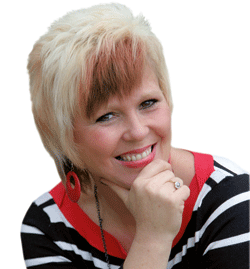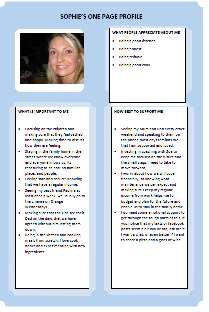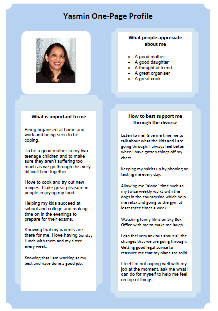Executive Director at Action on Hearing Loss, Louise shares how she uses her one-page profile professionally; introducing it into their recruitment process and using it to break the ice with colleagues and families when meeting for the first time.
Written by Louise Pritchard
At Action on Hearing Loss we have made a commitment to personalisation and have a programme approach looking at ways we can improve as an organisation to be more person centred.
One of the things we have been doing is asking everyone working in our Care and Support directorate to have a one-page profile. The process of creating these has helped people and teams to understand each other more, and provided an insight into the best way of working with colleagues. By creating my own one-page profile I recognised that I am a pragmatist and a realist and now my colleagues know not to be put off if I put creative ideas down, they know to work with me to find a practical solution.
We live in a culture where giving or receiving a compliment can feel uncomfortable. Using like and admire in team meetings has broken down this barrier and people have said afterwards they feel they can be more honest and open with each other. Staff have found it really helpful in appraisals and one to ones too. The profiles facilitate positive feedback and open up conversations. We have found that talking about “how best to support me” makes it easier for staff to ask for the support they need from their manager.
I can see when a team has adopted one-page profiles as they “gel” together and work in harmony; they understand how to get the best out of each other. People have found it easier to work out issues when there is no blame – just “this is how I see it”. When other depts. have seen the positive impact this work has had its inspired them to create their own one-page profiles.
We use one-page profiles as part of recruitment, asking people to create their own profile and bring it with them to interview. This means the people we support can get to know a bit about candidates and be more effectively involved in the recruitment. We want the people who work for us to understand they need to give something of themselves in order to create trust and build a relationship with the people we support.
My one-page profile has given me insight into the way I work, and how others see me. I have two BSL sign names that have been given to me by people I work with, one is a clawed hand on the back of the head as I always wear my hair in a bun, and the other is the sign for “down to earth”.
When I am out visiting services or attending events some staff can find meeting an Executive Director a bit daunting, but after reading my one-page profile it breaks the ice and people know they can just talk to me, hence the sign name “down to earth”.
I attend a lot of conferences and formal gatherings, and I get sent the conference pack with biographies of speakers, or asked to send mine. They tend to be very formal about the person’s professional achievements and where they have worked, but don’t give you a sense of the person or what’s important to them.
I am often tempted to send my one-page profile instead of the traditional biography but I have so far held back as I wonder if people would know what a one-page profile was. Next time I will be brave and put it out there with the biography!!





